News + Articles
What are the Pros and Cons of Dental Implants?
Missing teeth can hurt your confidence and your oral health. At Restoration Dental OC, we know you have questions about dental implants.
This guide examines the pros and cons of dental implants and covers other tooth replacement options. This will help you decide if implants fit your smile and health goals.
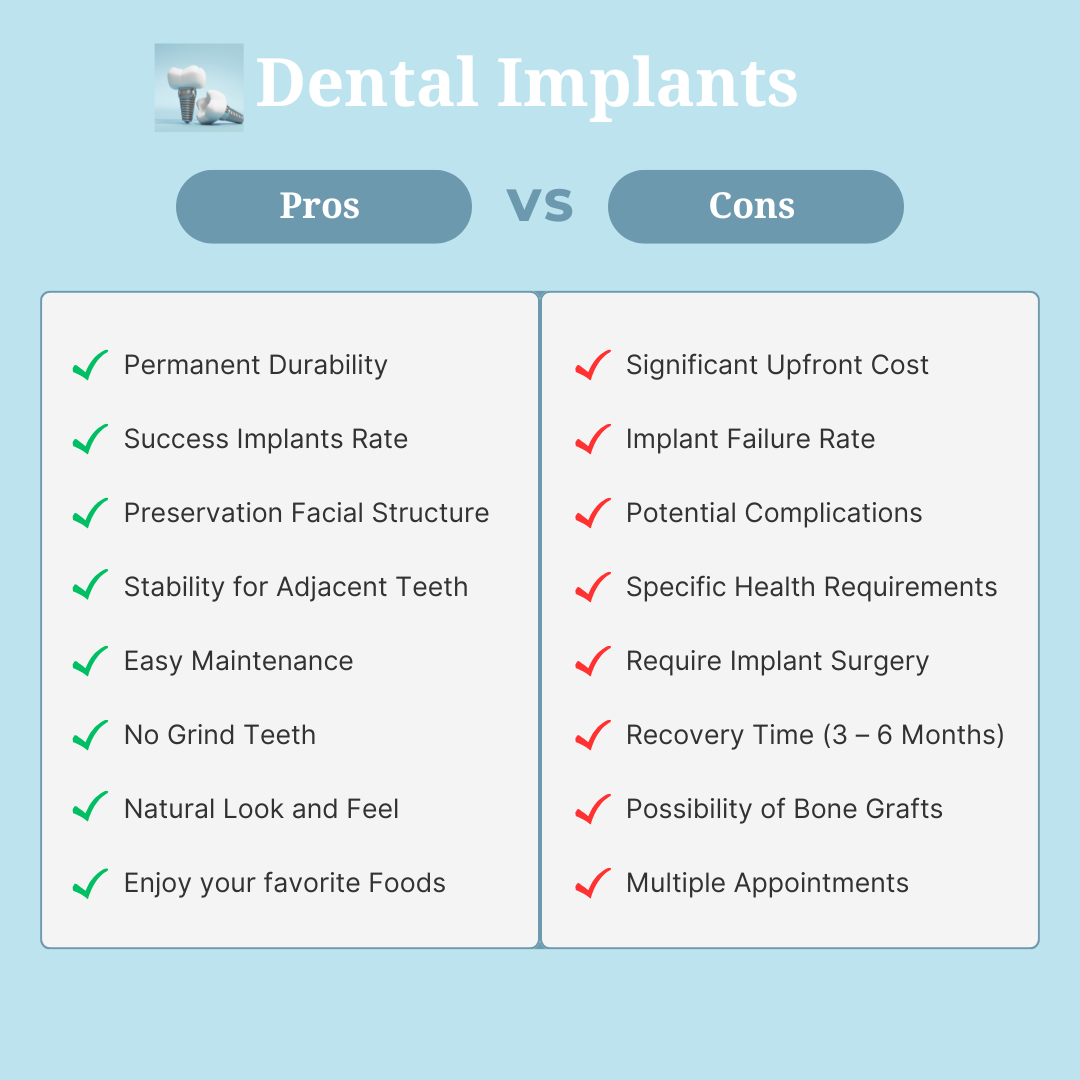
Pros Of Dental Implants
First, review why many have chosen dental implants to replace lost teeth. What are the advantages of dental implants?
Permanent Durability
One of the biggest advantages of implants is their incredible durability. The titanium post fuses to your jawbone in a process called osseointegration.
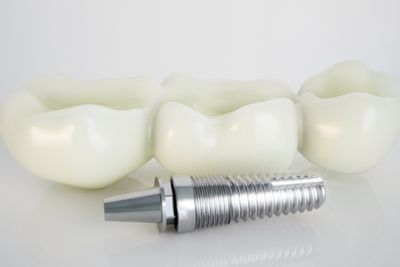
This means the implant actually becomes part of you! It creates a strong anchor that can withstand heavy biting and chewing for over 25 years on average.
Success Implants Rate
Dental implant procedures have a success rate of 90 – 95% over a 10-year period. This is thanks to new technology and improved techniques.
However, it’s crucial to consider that various factors influence this rate. The implant’s position in the jaw is key. The patient’s health and sound oral care habits are also important.
Dental implants have a high success rate, which is a significant benefit. Beyond restoring tooth function, they also help maintain your natural facial appearance.
Preservation of Facial Structure
Losing teeth can change how your face looks. It can make your cheeks and lips look sunken in, making you appear older.
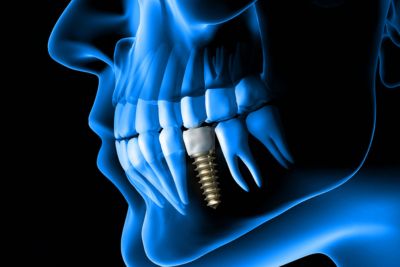
Dental implants work like your natural teeth. They help stimulate the jawbone and stop bone loss. This helps keep your natural facial shape and makes you look younger.
In addition to preserving your facial structure, dental implants also provide much-needed stability to nearby teeth.
Stability for Adjacent Teeth
Another key benefit is the stability of your nearby teeth. Missing teeth can make nearby teeth shift.
This can cause bite problems and raise the risk of tooth decay and gum disease. Dental implants fill the gap left by tooth loss. They give stability to the nearby teeth and stop them from shifting.
Stabilizing nearby teeth boosts oral health and makes dental care easier over time. Speaking of ease, dental implants are also remarkably simple to maintain.
Easy Maintenance
Just like your natural teeth, regular brushing and flossing are key. Don’t forget those checkups with your dentist, too! They’ll help make sure your implants stay healthy for years to come.
And the best part? No messy adhesives or special cleaning routines are needed. They blend in and feel like your teeth, making them a super convenient option!
No Need to Grind Healthy Teeth
Unlike bridges, which must grind your healthy teeth for support, implants stand strong. This means you can replace the teeth without affecting the ones left. Dental implants are also designed to look and feel like your natural teeth.
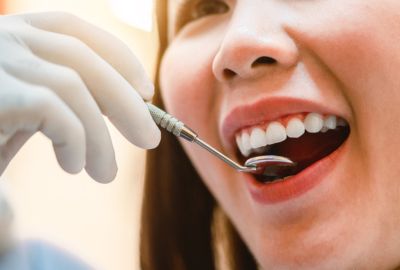
Confidence with a Natural Look and Feel
Dental implants provide a natural look and feel. A custom crown is placed on top of the implant, matching your surrounding teeth perfectly.
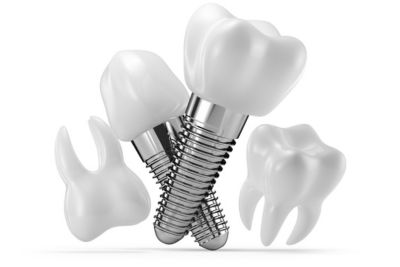
This improvement brings joy to your everyday life. Dental implants look natural and have great benefits. They let you enjoy your favorite foods freely.
8. Enjoy Your Favorite Foods
Dental implants are stable and robust because they are integrated with your jaw. It lets patients bite and chew with confidence and stability.

Dental implants have many benefits, but there are also potential downsides. Let’s now turn our attention to the disadvantages of dental implants.
Cons of Dental Implants
Significant Upfront Cost
One of the most notable disadvantages of dental implants is their high upfront cost. Getting dental implants involves multiple stages.
These include surgery, healing, and the creation and attachment of the custom crown. These steps accumulate, leading to a considerable initial investment.
Note: Dental implants might have a higher initial price than dentures or bridges. Yet, their lasting benefits and strength often make them a cheaper choice in the long run.
Implant Failure Rate
While dental implants boast remarkable success, it’s important to have a complete picture. Dental implant treatment carries a small failure rate (5-10%), like any medical procedure.
Implant failure is rare. It’s usually connected to specific factors your dentist can identify and minimize. Meticulous planning, skilled surgical execution, and diligent aftercare significantly minimize these risks.
Potential Complications
As with any surgery, implant procedures carry potential risks. Complications such as infections, nerve damage, and sinus problems can occur.
It’s important to be aware of these possibilities. Fortunately, the vast majority of patients experience successful outcomes without complications.
To ensure the best possible experience, communicate openly with your dentist. Discuss any personal risk factors and concerns you may have. They provide personalized help and answer your questions. This empowers you to make a smart treatment choice.
Specific Health Requirements
Not everyone qualifies, which is another key limitation. Some health issues may affect your eligibility for implants. These include uncontrolled diabetes, gum disease, and tooth decay.
A thorough consultation with your dentist is crucial. It will determine whether implants are right for you.
Require Dental Implant Surgery
Dental implants require a minor surgical procedure. This involves your dentist surgically inserting a small titanium post into your jawbone. This procedure usually uses local anesthesia and has a strong safety record for most patients.
Recovery Time
The healing process after implant surgery can take a few months. It’s important to be aware of this. This is the time when osseointegration occurs. It lets the implant fuse with the jaw.
Patients may experience discomfort, swelling, and dietary restrictions during the initial healing period. It’s crucial to follow the dentist’s post-operative instructions. Doing so ensures proper healing and reduces the risk of complications.
Possibility of Bone Grafts
The implant process can sometimes become more complex. You might need a bone graft if your jaw isn’t thick or strong enough for an implant. This adds an extra step to the process and increases healing time.
Multiple Appointments
Dental implants provide a lasting fix for lost teeth, but patients must commit to the process. This requires teamwork with your dentist over several appointments, which can take months.
Your dentist will check your oral health. Then, they will place the implant. After that, you’ll need time to heal. Finally, they will attach your custom-made restoration.
The typical process often entails 3 to 5 appointments. However, the exact number of visits can vary depending on individual patient needs.
Crown Replacement Needed
Even after a successful implantation, think about long-term care. The implant can last a lifetime if you maintain it well.
However, the crown may wear out after 10 to 15 years. Replacing the crown is generally less invasive than the initial implant placement. But, complications might arise. This may require additional procedures, which can involve additional cost and healing time.
Temporary Dietary Adjustments
Your dentist may recommend a temporary soft food diet during the healing period. This is to protect the implant site and facilitate optimal healing and osseointegration.
Think of this as giving your mouth extra gentle care while it recovers! This dietary phase is temporary, and as you heal, you’ll gradually be able to enjoy your regular diet again.
Dental Implants vs. Alternatives
Below is a comparison of implants with other standard ways to replace teeth. You can refer to it.
Vs. Dental Bridges
Dental bridges offer a dependable way to replace teeth. However, they need to alter and support adjacent teeth, which can be a significant drawback.
While bridges might seem less expensive initially, implants usually offer better long-term value by helping maintain jaw structure and providing greater longevity.
Vs. Dentures
Dentures are another common tooth replacement option that are removable and relatively inexpensive.
They also remove the need for surgery. However, dental implants have far superior stability and functionality.
They offer a more natural feel. They improve comfort, speech, and eating safety. Dentures have the risk of slippage. Additionally, implants are instrumental in supporting the health of the jawbone.
Consequences of No Replacement
Not replacing a missing tooth might save money initially, but this short-term solution has significant consequences for oral health.
These include the displacement of other teeth. They cause trouble when chewing and speaking.
They also lead to worsening tooth decay. Dental implants can prevent these problems. They can also prevent more complicated dental issues.
Feature | Dental Implants | Bridges | Traditional Dentures |
Longevity | Lifetime with proper care | 5-15 years or longer | 5-10 years (full), up to 15 years (partial) |
Bone Preservation | Yes | Some, but less than implants | No, accelerates bone loss |
Natural Look and Feel | Most natural | Can look natural, feel may vary | Less natural |
Oral Health Impact | Preserves natural tooth structure | Requires altering adjacent teeth | Decay and gum disease (trap food) |
Chewing and Speech | Restores full chewing function | Affects chewing and speech initially | Can slip or click, affecting function |
Initial Cost | Higher | Lower | Lower |
Treatment Time | Longer | Shorter | Shorter |
Potential Complications | Nerve damage, implant failure... | Decay, damage to adjacent teeth... | Sores, difficulty eating and speaking |
Who’s a good candidate for dental implants
Generally, a good candidate is someone who:
- Has good oral health.
- Is committed to oral hygiene.
- Is in good general health.
The best way to know for sure is to consult with your dentist. They can check if dental implants are right for your healthy, confident smile!
Dentist In Orange, CA
Thinking about dental implants in Orange, CA? It’s a big step; you deserve to feel comfortable and supported. Dr. Ronald Pham at Restoration Dental OC is a caring dentist in Orange, CA, who is here to gently guide you.
Call us at 714-400-0075 if you want to learn more about implants or just chat in a relaxed setting. We’re here to listen and help you explore your options.
Check out what others say about our services: Read our Google Reviews.

Dr. Ronald Pham, DDS, is a Doctor of Dental Surgery who graduated from the USC Ostrow School of Dentistry in 2015. With over 8 years of experience in restorative dentistry, including dental implants, crowns, bridges, fillings, root canals…
Dr. Pham has restored the smiles of +2,000 patients and is committed to providing professional dental care focused on patient comfort. He achieves this by combining a welcoming space and state-of-the-art dental technology.

Guaranteed Smiles!
As a premiere dentist office in Orange CA, we will always make sure that your experience is memorable, friendly, and professional. We strive to meet your highest expectations in every way imaginable, from your very first interaction with our office staff, to the quality of treatment you receive. We don’t take our patients’ trust for granted, and will promise to over-deliver with your best interest in mind. So give us a call today, and experience our first-class service!
